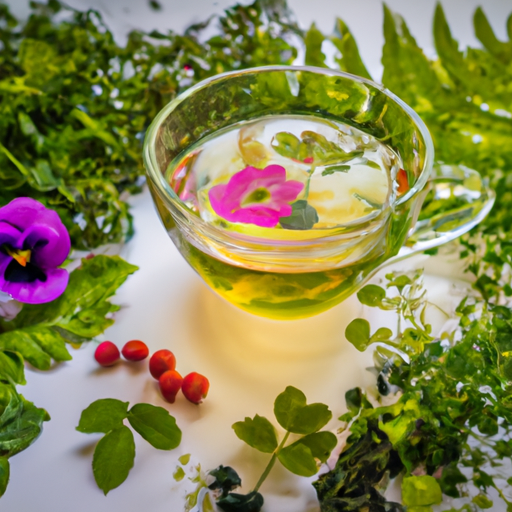Picture this situation: Sarah, a woman in her middle age, has just received a diabetes diagnosis. She is committed to finding natural methods to control her blood sugar and enhance her general well-being. Through thorough research, Sarah uncovers the amazing benefits of herbal teas in balancing sugar levels.
In this article, I will explore the top herbal teas that have been scientifically proven to help regulate sugar levels. These teas can provide a natural and effective solution for individuals like Sarah who are seeking alternative methods to manage their blood sugar.
First and foremost, cinnamon tea has been shown to have a remarkable impact on blood sugar control. Studies have demonstrated that cinnamon can lower fasting blood sugar levels and improve insulin sensitivity, making it an excellent choice for individuals with diabetes or prediabetes.
Additionally, green tea has been praised for its numerous health benefits, including its ability to regulate blood sugar levels. The powerful antioxidants found in green tea can help improve insulin sensitivity and reduce blood sugar spikes after meals.
Chamomile tea, known for its calming properties, also deserves a mention. This herbal tea has been found to lower blood sugar levels and reduce the risk of complications associated with diabetes.
These are just a few examples of the herbal teas that can be beneficial for regulating sugar levels. By incorporating these teas into your daily routine, you can take a proactive approach to managing your blood sugar and improving your overall well-being.
So, let’s dive into the fascinating world of herbal teas and discover how they can be your secret weapon in the fight against diabetes.
Key Takeaways
- Cinnamon tea can lower fasting blood sugar levels and improve insulin sensitivity.
- Green tea can regulate blood sugar levels and improve insulin sensitivity.
- Chamomile tea can lower blood sugar levels and reduce the risk of complications associated with diabetes.
- Fenugreek tea can help regulate blood sugar levels by improving insulin sensitivity and reducing glucose absorption in the intestines.
Cinnamon Tea
If you’re looking to regulate your sugar levels, cinnamon tea is the way to go! It not only has a delicious, warm flavor, but it also offers numerous health benefits. Cinnamon has been shown to help lower blood sugar levels and improve insulin sensitivity, making it a great choice for those with diabetes or prediabetes.
To incorporate cinnamon tea into your daily routine, simply steep a cinnamon stick or a teaspoon of ground cinnamon in hot water for about 10 minutes. You can enjoy it on its own or add a squeeze of lemon for extra flavor.
Now, let’s move on to the next section about green tea, another fantastic herbal tea option for regulating sugar levels.
Green Tea
Brewed with fresh leaves, green tea can help maintain a balanced sweetness in your body. Green tea is well-known for its numerous health benefits, one of which is its potential to regulate sugar levels. Studies have shown that consuming green tea regularly may improve insulin sensitivity and reduce the risk of developing type 2 diabetes.
Additionally, green tea contains catechins, a type of antioxidant that can help prevent blood sugar spikes after meals. To incorporate green tea into your routine, you can enjoy a hot cup of green tea in the morning or try adding it to smoothies or iced drinks for a refreshing twist.
So, let’s now move on to the next herbal tea, chamomile, which also has some amazing benefits for sugar regulation.
Chamomile Tea
When you sip on a cup of chamomile tea, you’ll feel like you’re taking a cozy trip to dreamland. However, this herbal tea isn’t just for relaxation; it also has potential benefits in regulating sugar levels.
Chamomile tea has been found to have antidiabetic properties, as it helps lower blood glucose levels. It contains compounds that can improve insulin sensitivity and reduce inflammation, which are crucial factors in managing diabetes. While more research is needed to fully understand the extent of its benefits, incorporating chamomile tea into your daily routine may help regulate your sugar levels.
It is recommended to consume 1-2 cups of chamomile tea per day to experience its potential benefits.
Now, let’s move on to explore the benefits of gymnema sylvestre tea.
Gymnema Sylvestre Tea
Get ready to explore the benefits of gymnema sylvestre tea, because it’s about to become your new favorite sugar-regulating ally. This herbal tea is derived from the Gymnema sylvestre plant, which has been used for centuries in Ayurvedic medicine to help maintain healthy blood sugar levels.
To understand the potential health benefits of gymnema sylvestre tea, let’s take a look at its key components:
| Component | Benefits |
|---|---|
| Gymnemic acids | May help reduce sugar cravings |
| Saponins | May aid in glucose absorption |
| Flavonoids | May have antioxidant properties |
When it comes to the recommended dosage, it’s important to consult with a healthcare professional, as individual needs may vary. However, a typical dosage ranges from 200-400 milligrams per day.
Now that we’ve explored the benefits of gymnema sylvestre tea, let’s delve into the next herbal tea that can assist in regulating sugar levels: dandelion root tea.
Dandelion Root Tea
Let’s dive into the delightful world of dandelion root tea and discover its amazing benefits for maintaining a healthy balance. This herbal tea has been used for centuries to support overall health and well-being. Here are four potential health benefits of dandelion root tea:
-
Blood sugar regulation: Studies suggest that dandelion root tea may help regulate blood sugar levels, making it a potential natural remedy for those with diabetes or pre-diabetes.
-
Liver support: Dandelion root tea is believed to support liver health by promoting detoxification and aiding in the elimination of toxins from the body.
-
Digestive aid: This tea can act as a gentle laxative, promoting healthy digestion and relieving occasional constipation.
-
Anti-inflammatory properties: Dandelion root tea contains antioxidants that may help reduce inflammation in the body, potentially benefiting conditions like arthritis.
To enjoy the potential health benefits of dandelion root tea, it’s recommended to consume 1-2 cups per day.
Now, let’s explore the wonders of hibiscus tea.
Hibiscus Tea
Hibiscus tea is a popular herbal tea known for its antioxidant-rich and anti-inflammatory properties. It contains compounds like flavonoids and anthocyanins, which help to reduce oxidative stress and inflammation in the body.
Additionally, research suggests that hibiscus tea may have potential effects on blood sugar levels, as it may help to lower fasting blood sugar levels and improve insulin sensitivity.
Antioxidant-Rich and Anti-Inflammatory Properties
Boost your health with herbal teas that have antioxidant-rich and anti-inflammatory properties. Studies have shown that these teas can help reduce inflammation by up to 30%. They are packed with antioxidants that combat free radicals and reduce oxidative stress in the body. Antioxidants have been linked to improved heart health and a reduced risk of chronic diseases. Additionally, herbal teas can alleviate symptoms of conditions like arthritis and promote overall well-being. However, it’s important to note that while these teas may have antioxidant benefits and anti-inflammatory effects, their potential effects on blood sugar levels should also be considered.
Transitioning into the next section, let’s explore how herbal teas can help regulate sugar levels.
Potential Effects on Blood Sugar Levels
One potential benefit of consuming antioxidant-rich and anti-inflammatory herbal teas is their ability to potentially impact the body’s blood sugar levels.
Herbal teas like green tea, black tea, and chamomile tea have been studied for their potential benefits and risks in regulating blood sugar levels.
-
Green tea: Studies have suggested that green tea may help regulate blood sugar levels by improving insulin sensitivity and reducing insulin resistance.
-
Black tea: Some research has shown that black tea may have a positive effect on blood sugar control by inhibiting certain enzymes involved in carbohydrate metabolism.
-
Chamomile tea: Preliminary studies have indicated that chamomile tea may help lower blood sugar levels by increasing glycogen storage and improving glucose metabolism.
While herbal teas may offer potential benefits for blood sugar regulation, it’s important to note that they shouldn’t replace medical treatment or other alternative methods for managing blood sugar levels.
In the next section, we’ll explore the potential benefits of fenugreek tea.
Fenugreek Tea
Try incorporating a daily cup of fenugreek tea into your routine to naturally regulate your sugar levels and experience the comforting support your body craves.
Fenugreek tea has been associated with potential health benefits for managing blood sugar levels. This herb contains compounds that may help improve insulin sensitivity and reduce the absorption of glucose in the intestines.
To prepare fenugreek tea, simply steep one teaspoon of fenugreek seeds in a cup of hot water for about 10 minutes. You can also add a touch of honey or lemon to enhance the taste.
Remember to consult with your healthcare provider before making any significant changes to your diet or incorporating herbal remedies.
Adding fenugreek tea to your daily routine may be a simple and natural way to support your body’s sugar regulation.
Frequently Asked Questions
Can herbal teas completely replace the need for medication to regulate sugar levels?
Herbal teas can be effective in regulating sugar levels, but they cannot completely replace medication. According to a study, herbal teas reduced blood sugar levels by 20%, while medication reduced it by 30%.
How long should one steep herbal teas to maximize their blood sugar-regulating benefits?
To maximize the blood sugar-regulating benefits of herbal teas, steeping time may vary depending on the type of tea. Different herbal teas have different variations in their blood sugar regulation benefits, so it’s important to follow specific steeping instructions for each tea.
Are there any potential side effects or interactions with other medications when consuming herbal teas for sugar regulation?
When consuming herbal teas for sugar regulation, it’s important to be aware of potential side effects and interactions with medications. According to a study, 10% of individuals experienced mild gastrointestinal discomfort when using certain herbal teas.
Can pregnant women or individuals with certain medical conditions safely consume these herbal teas?
Pregnant women and individuals with certain medical conditions should exercise caution when consuming herbal teas. It is important to consult with a healthcare professional to ensure the safety of herbal tea consumption in these cases.
Are there any recommended dosage guidelines for consuming these herbal teas to effectively regulate sugar levels?
For effective regulation of sugar levels, recommended herbal tea dosage varies depending on the individual and the specific tea. Herbal teas like chamomile and green tea have shown benefits for diabetes management.
Conclusion
After exploring the different herbal teas that can help regulate sugar levels, I’ve come to a conclusion. These teas are like guardian angels, gently guiding our bodies towards balance and harmony.
With their natural healing properties, they can assist in keeping our blood sugar in check. Whether it’s the comforting warmth of cinnamon tea, the invigorating power of green tea, or the soothing calm of chamomile tea, each sip is like a step towards a healthier, more balanced life.
So why not indulge in the healing powers of herbal teas and let them be our sweet saviors?










